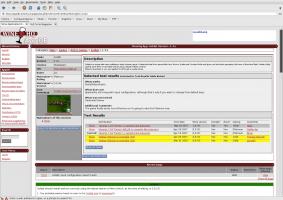11 - Blaine Points Imperialism Southward

Via The NY Transfer News Service ~ All the News that Doesn't Fit
How Capitalists Rule: The Republocrats
Part 11:
Blaine Points Imperialism Southward
by Vince Copeland
One of the most important appointments made by President Benjamin Harrison was that of Secretary of State. He named a professional politician, none other than James G. Blaine, who was by 1889 the intimate of several of the very biggest of the money crowd. Blaine had smelled out the coming imperialist expansion to overseas colonies and semi-colonies well before his acquaintances and even some of his masters did.
Blaine pointed U.S. policy south into Mexico, the Caribbean and South America at a time when the U.S. investment level there totalled well under a billion dollars. He was somewhat ahead of his time in this respect. Like the two Roosevelts, he often understood what was good for capitalism before the capitalists did.
But it remained for a Democratic Secretary of State, Richard Olney, to pick a fight with mighty England over a boundary dispute in South America. Olney was appointed by Grover Cleveland in his second term (1893-97), and had already served as Secretary of War. He invoked the sacred Monroe Doctrine and faced off the British in a tough little diplomatic skirmish. This gave notice that the United States would be the big ruler of Latin America and grab Spain's colonies for the profits of its own big business rather than England's.
After Cleveland was well out of the presidency, J.P. Morgan suggested he be made a trustee of the Harriman-Ryan Equitable Life Assurance Society. This company was going through a well-publicized scandal involving a lot of corruption and needed someone of great probity, like the Buffalo hangman, to give it a better odor.
This was in 1905. But subsequent testimony indicated that in the same year, Cleveland, along with Oliver H. Payne, William C. Whitney and others, participated in a stock market pool that made him a lot of money. (Ferdinand Lundberg, "America's 60 Families," p. 57) A payoff? Only an un-American skeptic would say that!
Power of the Senate
While big business was getting closer to complete domination of the two big political parties, the form and concentration of government itself was changing somewhat. The House of Representatives had been the center of political power during the Civil War and Reconstruction, but during the period of reaction that followed, the center of power shifted to the Senate.
This came about first because of the exhaustion of the social forces behind the radicalization of the House, and second because the new political leaders -- or "bosses" -- found it easy to become senators by bribing or intimidating the legislatures, which still elected them. Election to the Senate by popular vote wasn't introduced until 1913.
The concentration of power in the Senate also came about because the potential centralism of the presidency could not yet be fully realized. That is, the economic power of capitalism, although growing more concentrated, still had a number of emerging centers, often in competition with one another.
There were not only the Rockefeller oil trust and the Morgan financial power, but steel (not yet in Morgan's hands), sugar, tobacco, lumber, cotton, textile, packing house, mining, and more. All were big economic entities on the way to becoming monopolies and each openly served by one, two or more senators.
The organizer and leader of these oligarchs in the Senate was Nelson Aldrich, senator from Rhode Island. He was the main conduit to the very biggest tycoons.
Aldrich was in the confidence of J.P. Morgan and of John D. Rockefeller as well.
Amalgamating in heaven
Not the least of the amalgamations of these big interests occurred when, in 1901, Aldrich's daughter Abby married John D. Rockefeller Jr. This was a marriage made in bourgeois heaven. It sealed the fate of many a small corporation and laid out the lines of exploitation for some millions of workers in the coming decades.
This period of senatorial ascendancy climaxed in the election of 1896 and exploded in the Spanish-American War of 1898.
Its relative decline set in about 1906, when the agitation for popular election of senators became irresistible. Finally in 1913 the passage of the 17th Amendment provided for popular election of the Senate.
After that, the more dignified -- and more powerful -- dictatorship of the presidency became the center of power.
The mysterious power of Aldrich
How could one man, Nelson Aldrich, tell the whole U.S. Senate what to do? And even more, how could a senator from the smallest state have such an influence with senators from states 10 or 20 times larger?
In 1906 Rhode Island had less than half a million people, with only about 70,000 of them active voters. When Aldrich first went to the Senate in 1881, there had been considerably fewer. Yet by 1906, according to a popular commentator of the day, Aldrich had it completely sewed up. The increased population was not the slightest problem.
"The Aldrich machine controls the legislature, the election board, the courts -- the entire machinery of the Republican form of government," this commentator wrote. "In 1904 when Aldrich needed a legislature to re-elect him for his fifth consecutive term, it is estimated that carrying the state cost him $200,000 -- a small sum, easily to be got back by a few minutes of industrious pickpocketing in Wall Street, but a very large sum for Rhode Island politics." (David Graham Phillips, "Treason of the Senate," p. 79)
And to anticipate his later greatness, here is the summary of his talents by the same author:
"Before he reached the Senate, Aldrich had had 15 years of training [in the Rhode Island legislature and the House of Representatives -- V.C.] in how to legislate the proceeds of the labor of the many into the pockets of the few. He entered it as the representative of local interests engaged in robbing by means of slyly worded tariff schedules.... [He] demonstrated excellent talents for sly, slippery work in legislative chambers and committee rooms and his security in his seat against popular revulsions and outbursts together marked him for the position of chief agent of the predatory band which was rapidly forming to take care of the prosperity of the American people."
"Various senators represent various divisions and subdivisions of this colossus," the writer continues. "But Aldrich, rich through franchise-grabbing, the intimate of Wall Street's great robber barons, the father-in-law of the only son of Rockefeller -- Aldrich represents the colossus." (Ibid, p. 83)
This somewhat rhetorical, but no less accurate, description of a party chief explains the real source of power of the U.S. senator in the 1890s and early 1900s. It differs from Josephson's picture of the 1880s that we cited earlier, only because now the senators, while still very powerful, no longer have that relative independence with which they could implicitly defy or ignore even some of the biggest capitalists at times.
Imperialism takes over
Modern imperialism is the taking over of other countries through economic penetration, export of capital, which in turn is thrust outward by tremendous expansion inside the "mother" country and the growth of monopoly. This process was speeded up in the 1880s, first by the unprecedented growth of railroads and then by the oil industry, led by the Rockefeller Standard Oil Co.
Between 1879 and 1884 $3.4 billion in new railroad stock was issued. (Augustus Myer, "History of the Supreme Court," p. 574) Railroads formed about one-fifth of the total wealth of the country and were falling into fewer and fewer hands. While it is hard to gauge how much $3.4 billion would be today, this sum was more than twice the amount of the war-swollen national debt at that time.
The railroads were expanding into Mexico and Canada during the 1880s, while Standard Oil was going to Europe and Asia. Of course, this could not have happened without close connections to and cooperation from the national government.
Staking out the Pacific
In this war of "peaceful" expansion of trade, there was one big shot that misfired. Even before the Civil War, the shipping interests, mostly Northern, tried to take over Japan, which was then regarded as very vulnerable. For nearly two and a half centuries, Japan had barred all foreign countries -- except for Holland -- from doing business there. It had few modern arms and no modern ships.
The U.S. sent three warships to Japan in 1854 and "opened up" that country to U.S. trade. The "opening" was done with guns, of course. But the disunity of the ruling class elements in the North and South at that time prevented a coherent policy from being shaped before the Civil War. And for some years afterward the preoccupation with Reconstruction prevented much more attention being paid to Japan.
The Japanese capitalists made good use of the intervening time to modernize. They launched a revolutionary "restoration" in 1868, putting back on the throne what was to prove a puppet monarchy while proceeding to build a modern capitalist state. At the same time, the United States established in Japan a semi-colonial "extraterritoriality" in which Americans were tried in American courts there and U.S. business interests took precedence over Japanese. But this could only be maintained until 1899.
It was significant that Japan went to war against China in 1894. It took over the island of Taiwan, renaming it Formosa, and thus emerged as a contending imperialist power while still a semi-colonial footstool in relation to the United States.
The relationship of the U.S. to Japan was somewhat like that of the English to India, in the sense that the U.S. was trying to build a fence around its trading empire, but was not yet exporting capital or directly exploiting workers abroad.
The problems of world expansion, however, were already evident.
-30-
(Copyright Workers World Service: Permission to reprint granted if source is cited. For more info contact Workers World,46 W. 21 St., New York, NY 10010; "workers@igc.apc.org".)
-----
NY Transfer News Service
Modem: 718-448-2358 nytransfer@igc.org nyxfer@panix.com




















